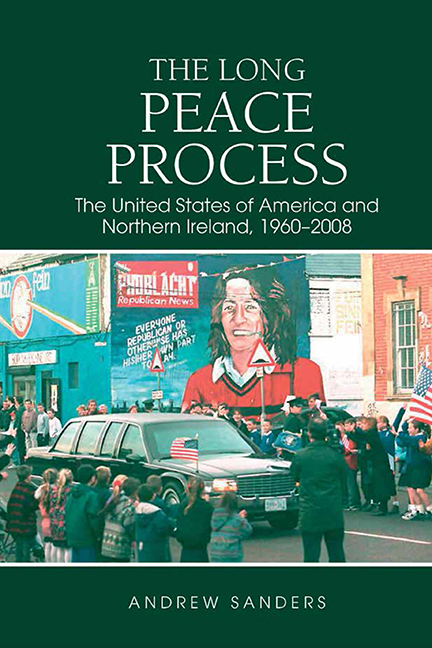Book contents
- Frontmatter
- Contents
- List of Abbreviations
- Acknowledgements
- Introduction
- 1 The USA and Ireland before 1968
- 2 The Early Years of the ‘Troubles’
- 3 Jimmy Carter and the Presidential Statement on Northern Ireland
- 4 Thatcher, Reagan, and Northern Ireland
- 5 The Bush Administration and Northern Ireland as a Local Political Issue
- 6 Bill Clinton and the Path to Good Friday
- 7 George W. Bush, Barack Obama, and Post-Conflict Northern Ireland
- Conclusion
- Select Bibliography
- Index
1 - The USA and Ireland before 1968
- Frontmatter
- Contents
- List of Abbreviations
- Acknowledgements
- Introduction
- 1 The USA and Ireland before 1968
- 2 The Early Years of the ‘Troubles’
- 3 Jimmy Carter and the Presidential Statement on Northern Ireland
- 4 Thatcher, Reagan, and Northern Ireland
- 5 The Bush Administration and Northern Ireland as a Local Political Issue
- 6 Bill Clinton and the Path to Good Friday
- 7 George W. Bush, Barack Obama, and Post-Conflict Northern Ireland
- Conclusion
- Select Bibliography
- Index
Summary
American political figures were intrigued by the newly partitioned Ireland from the earliest years of the two new states. In 1925, shortly before the Irish Boundary Commission concluded its work on the redrawing of the border between the Irish Free State and Northern Ireland, Senator Joe Robinson, an Arkansas Democrat, visited the two new states as part of a European tour. The previous decade had seen significant unrest across Ireland, not least two major internal conflicts in the form of the Irish War of Independence and the subsequent Irish Civil War. Robinson was one of the earliest international visitors to newly partitioned Ireland and his extensive articles, published on consecutive Sundays in the New York Times, drew attention to the political stability that began to develop there following the end of violence and alluded to the economic opportunities for industrialists:
Political agitation has almost ceased. Nothing sensational has occurred in Ireland during the last two years. No social upheaval is threatened. Nevertheless a new Ireland with which Americans are unfamiliar is being created … Nothing in modern history is more striking than the quick transition under the new Irish Government from the lawlessness and guerrilla warfare which prevailed in Ireland … to the astonishing condition of orderly peace which now exists … It could not have occurred if Irishmen generally had not become weary of violence and agitation.
He continued, at length, to extoll the virtues of post-conflict Ireland, though he was critical of the effort to restore the Irish language to Ireland: ‘Inevitably it will widen the breach between Northern Ireland and the Free State and tend to perpetuate the present separation. Gaelic cannot be made the language of the new Ireland, and the sooner this is recognized the better it will be for the cause of Irish progress’.
The second instalment of his report focused on Ulster. Robinson suggested that partition was ‘the outgrowth of conditions that render quite improbably, in the near future, the reunion of Ireland under a single Dominion Government. The rivalry between Northern Ireland and the Free State is notable, and indicates antagonism so distinct as to seem at present irreconcilable’.
- Type
- Chapter
- Information
- The Long Peace ProcessThe United States of America and Northern Ireland, 1960-2008, pp. 7 - 28Publisher: Liverpool University PressPrint publication year: 2019



